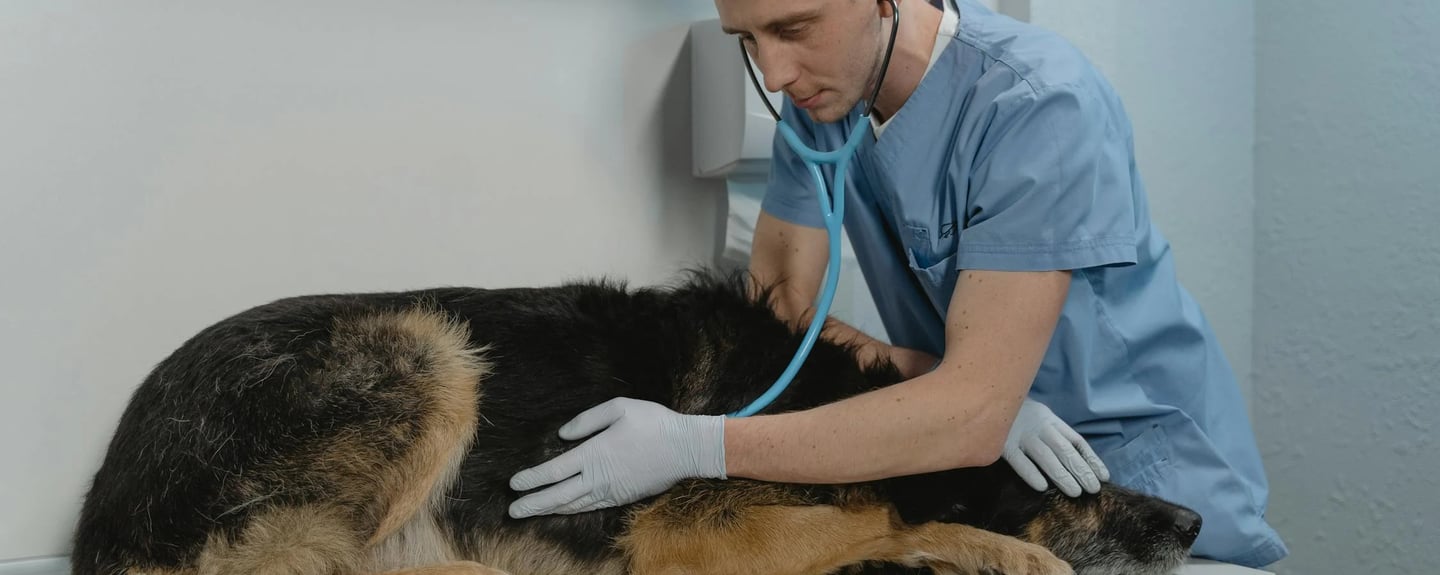Guaranteed Comfort and Complete Care for Your Pet.

Everything You Need To Know About Kennel Cough Treatment


Kennel cough is a common illness among dogs in shared spaces like parks or boarding centers. It spreads fast and causes a deep, dry cough. Our veterinary clinic Dubai pet owner trust, often sees cases linked to bacteria or viruses, especially during busy seasons. While mild cases respond well to rest and care, some dogs need more attention. Many owners start with kennel cough treatment at home, but symptoms can get worse without proper care, and extreme weather conditions. Look out for coughing, sneezing, or low energy. Early kennel cough treatment makes a big difference, so act quickly if you notice signs.
What Causes Kennel Cough?
Kennel cough spreads through bacteria and viruses that target a dog’s upper airways. The most common cause is Bordetella bronchiseptica, often combined with other viruses like canine parainfluenza or adenovirus. Dogs inhale these germs through airborne droplets, shared toys, or direct contact. The risk increases in crowded places such as shelters, grooming salons, or dog parks. Poor ventilation, stress, and sudden weather changes also make dogs more likely to get sick.
While the cough might not look serious, it very much is, especially in harsh weather conditions!
Symptoms often appear a few days after exposure. A dry cough is the main sign, but sneezing, nasal discharge, or tiredness may follow. Mild cases usually respond well to rest and basic care. Many owners start kennel cough treatment at home using hydration, a humidifier, or vet-approved supplements. Still, if symptoms linger or worsen, a vet visit becomes necessary. Early action helps prevent complications and keeps other dogs safe from infection. Keep your pet’s space clean and avoid risky areas during outbreaks.
How Can You Recognize the Symptoms?
Kennel cough symptoms can show up suddenly and vary in intensity. Most dogs stay alert but show signs that suggest discomfort. These signs often resemble other respiratory problems, so it’s easy to confuse them with a cold or allergy. That’s why it’s important to know what to watch for, so look out for the following:
Dry, harsh cough that sounds like honking
Retching or gagging, especially after coughing
Clear or cloudy nasal discharge
Mild fever or warm ears
Low energy or lack of interest in play
Loss of appetite in some cases
Symptoms usually appear a few days after contact with other dogs. Mild cases often improve with rest and hydration. Many owners try kennel cough treatment at home first, using steam, vet-approved syrups, or supplements. If symptoms get worse or last more than a week, call Petland Wellness Dubai for advice. Early care prevents complications and shortens recovery time.
When to Take Your Dog to the Vet?
Kennel cough can often start with mild signs, but some dogs need care beyond rest and hydration. Kennel cough treatment at home can ease discomfort in light cases, especially with proper rest, fluids, and steam. But to truly help your dog recover and avoid complications, you need to act quickly when symptoms get worse, especially because of the specific hot conditions in Dubai.


Please take your dog to the vet, so they can feel much better in no time!
If your dog has a persistent cough or shows signs of distress, it’s important to know when to take your dog to the vet. Warning signs include labored breathing, loss of appetite, or coughing that doesn’t ease up after a few days. If your dog starts to wheeze, act immediately. In some cases, untreated kennel cough may develop into a more serious condition like pneumonia. In these situations, your vet might recommend kennel cough pneumonia treatment, which may include antibiotics and close monitoring. Early care helps your dog recover faster and keeps the illness from spreading to others.
What are Common Kennel Cough Treatment Options?
Kennel cough treatment depends on the severity of symptoms and the dog’s overall health. Most mild cases clear up with basic care, while moderate or stubborn cases need medication. Early action helps reduce discomfort and shortens recovery, since hot and dry weather in Dubai could make your dog's throat hurt even more. Vets may suggest a mix of home care and medical support to help your dog feel better faster. Below are common kennel cough treatment options:
Antibiotics: used if the cause is bacterial or if there's a risk of infection
Cough suppressants: prescribed to ease irritation and give your dog some relief
Rest: helps the immune system recover without added stress
Hydration: keeps airways moist and supports overall healing
Treatment usually lasts one to two weeks. Keep your dog away from other pets during this time to prevent spreading the illness. Always follow your vet’s instructions and check in if symptoms don’t improve after a few days.
Kennel Cough Pneumonia Treatment
Untreated kennel cough can lead to pneumonia, especially in puppies, older dogs, or those with weaker immune systems. When coughing becomes deeper and more painful, and breathing turns labored, it’s no longer a simple case. At this stage, your dog needs urgent care. Kennel cough pneumonia treatment usually involves a combination of antibiotics and therapies to support breathing. Nebulization helps deliver medication directly into the lungs.
In more severe cases, oxygen support may be required to stabilize your dog. If symptoms become serious, hospitalization might be the safest option. Monitoring your dog at home is helpful in mild cases, but pneumonia requires professional care. Don’t ignore signs like fatigue, high fever, or loss of appetite. These could mean the infection has spread to the lungs. Early action shortens recovery time and prevents long-term damage. Always follow your vet’s advice when symptoms move beyond mild coughing or general discomfort.
Kennel Cough Treatment at Home
You can manage mild cases of kennel cough at home with the right steps. Start by using a humidifier to ease throat irritation. Keep your dog away from other pets to stop the infection from spreading. Make sure your dog drinks enough water throughout the day. Offer warm, easy-to-digest meals to support the immune system. Keep the space clean, quiet, and well-ventilated. Avoid walks during Dubai’s hottest hours. These simple steps can help with kennel cough treatment at home, especially when symptoms are light. But if coughing worsens or breathing becomes hard, contact your vet in Dubai without delay.
Can Allergies Make It Worse?
Allergies can make kennel cough worse. Dust, pollen, and air pollution can irritate your dog’s throat and lungs. If your dog already has kennel cough, allergies can add to the inflammation and delay recovery. Sneezing, watery eyes, or itching may also appear alongside coughing. These signs often confuse pet owners and make diagnosis harder. If allergies are suspected, consider veterinary allergy testing to uncover triggers. Identifying and removing allergens helps your dog heal faster. Treatment may involve antihistamines, diet changes, or limiting outdoor exposure during high-risk days. Managing allergies early reduces complications and makes other care, including kennel cough treatment, more effective.
Importance of Regular Vet Visits
Routine checkups help catch illness early and keep your dog in good shape year-round. Vaccines, including protection against kennel cough, are a key part of that. Dogs exposed to parks, daycares, or grooming centers need extra care to avoid infections, so pick only reliable places in Dubai! Even healthy dogs should see the vet a few times a year for screenings, parasite checks, and general health updates. Regular vet visits help ensure your dog’s health is closely monitored. These visits also give you a chance to ask about diet, behavior, or changes you’ve noticed. Preventive care is easier and cheaper than emergency treatment, as early action protects your dog.


Sometimes treatment at home can take your dog back to being their old playful self!
Always Check on Your Dog and React on Time!
Kennel cough spreads fast and can get worse without proper care. Mild cases often respond well to rest, fluids, and a clean space. But if symptoms don’t improve, your dog may need medication or more support. Watch for signs of pneumonia, especially in hot, dusty climates like Dubai. Keep up with vaccinations, manage allergies, and use home remedies carefully. If anything feels off, call your vet. Early help keeps things simple, and consistent care makes all the difference. When unsure, always ask a professional. If you're dealing with a sick pet now, don’t wait, contact us today, as kennel cough treatment works best when started early.
FAQ
How long does kennel cough usually last?
Mild cases often clear up in 1 to 2 weeks with rest and basic care. More serious infections may take longer.
Can I treat kennel cough at home?
Yes, kennel cough treatment at home can work for mild cases. But, it's advisable to take your dog to the vet.
When should I take my dog to the vet?
If your dog has a cough that lasts more than a few days, struggles to breathe, or stops eating, contact your vet immediately.
Can kennel cough lead to pneumonia?
Yes. If untreated, it may develop into a serious infection. In that case, kennel cough pneumonia treatment may involve antibiotics or oxygen therapy.
Is kennel cough contagious?
Very. Keep infected dogs away from others until symptoms disappear and your vet clears them.

